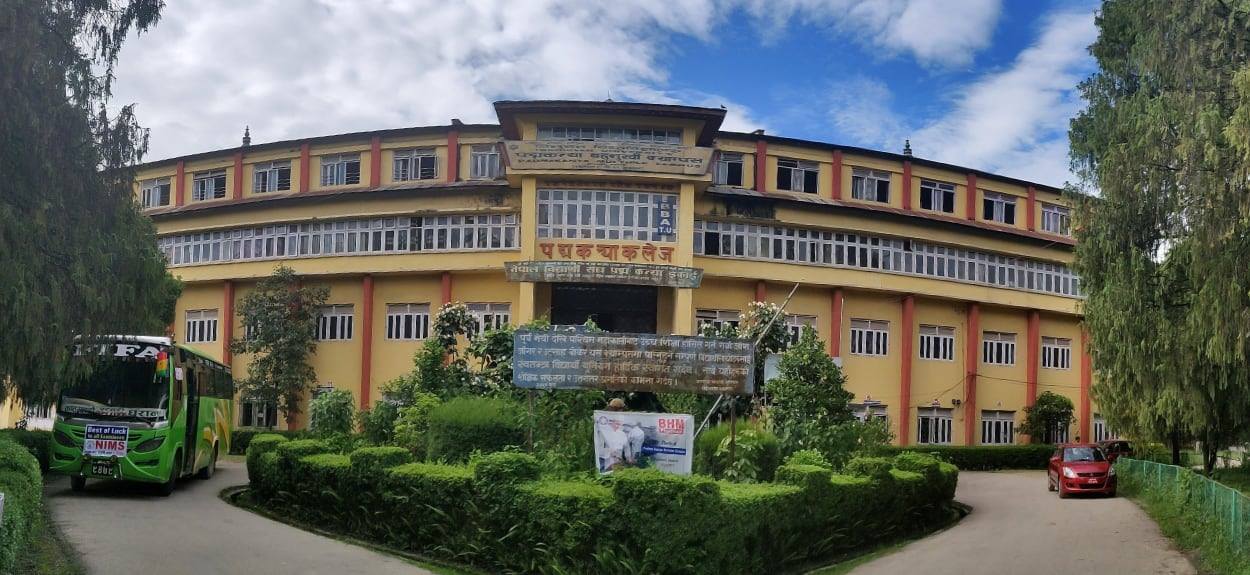Overview
Located in Bagbazar, Kathmandu, Padma Kanya Multiple Campus (PK Campus) is a distinguished educational institution, celebrated as the first women's campus in Nepal. Founded in 1951, its roots trace back to Kanya School, Dillibazar, before it settled at its current expansive location.
Over the years, PK Campus has expanded its academic horizon, now offering degrees in Humanities and Social Sciences, Management, Science and technology. With an international reach, the campus welcomes students from nations like India, Sri Lanka, and Korea, showcasing its diverse student body.
Spread over a vast 4.6-acre land, the campus boasts multiple buildings catering to academic, administrative, and accommodation needs. As it continues to grow, there are plans for infrastructural expansion and library enrichment. Upholding its noble motto, "Quality education for women empowerment", PK Campus remains a steadfast beacon for women's academic aspirations.
Academic Excellence
- Diverse Programs: Offers degrees in Humanities and Social Sciences, Management, and Science.
- Global Reach: Attracts students from countries including India, Sri Lanka, Korea, and more.
- Cultural Diversity: Houses students from varied socio-cultural backgrounds.
Campus Infrastructure
- Sprawling Space: Spreads over 4.6 acres.
- Facilities: Comprises buildings dedicated to classrooms, administrative needs, computer labs, libraries, and hostels.
- Accommodation: Features a girls' dormitory that can house up to 200 students.
- Future Prospects: Plans to renovate an old hostel for the Bachelor of Hotel Management (BHM) program. An additional area for the Master’s Dance program with theater and class facilities is also available.
Empowering Women: With its motto "Quality education for women empowerment", PK Campus stands as a testament to women's progress in the academic arena.
Current Needs and Future Endeavors
- Infrastructure Expansion: Despite its vast area, the growing academic demand necessitates more built spaces.
- Library Enrichment: The library awaits an expansion in its collection – books, journals, newspapers, magazines, and periodicals. There's a pressing need for e-library extension and modern upgrades.
Vision
Empowering Tomorrow: To metamorphose the campus into a Women’s University, characterized by autonomous operations, enhanced educational quality, rich resource availability, pioneering approaches in teaching and research, and expansive national and global outreach.
Mission
Education with Autonomy: The campus aspires to operate autonomously, delivering top-tier education tailored for women. It aims to equip them with the knowledge and skills crucial for life, diverse professions, and other endeavors, all within an environment that celebrates uniqueness and inclusivity.
Objectives/Goals
Building the Future of Women's Education:
Academic Prowess:
Elevate the academic caliber by:
- Refining and expanding curricula.
- Prioritizing research initiatives.
- Developing an IT-friendly infrastructure for modernized learning.
Empowerment through Education:
Commit to:
- Furnish women with the education that readies them for challenges in a fast-evolving, competitive global landscape.
Holistic Development:
Offer:
- A nurturing learning environment that enables women to realize their full potential.
- Opportunities for comprehensive personality growth, ensuring they are well-rounded in both academia and extracurricular pursuits.

Life at PK Campus:
Student Welfare Unit: At the heart of PK Campus lies the Student Welfare Unit, designed with the students' best interests in mind. This unit ensures that students' academic, emotional, and social needs are met, offering a range of support services to help them navigate the challenges of campus life.
PK Cafeteria: The PK Cafeteria serves as a hub of relaxation and camaraderie. Here, students can indulge in a variety of delicious and nutritious meals, catch up with friends, or simply take a break from their rigorous academic schedules.
Sports & Health: Emphasizing a holistic approach to student well-being, PK Campus boasts state-of-the-art Sports & Health facilities. Whether you're an athlete, fitness enthusiast, or someone just looking to stay active, the campus provides an array of options to keep you physically fit and mentally refreshed.
PK Girls Hostel: Ensuring a comfortable and secure living environment, the PK Girls Hostel offers a home away from home. With modern amenities and a supportive community, it's the perfect space for students to relax, study, and bond with their peers.
Student Club: Fostering creativity, leadership, and teamwork, the Student Club at PK Campus offers a plethora of activities and events. From cultural festivals to debates, students can hone their extracurricular skills and find their passions outside of the classroom.
Getting to PK: Conveniently located in Kathmandu, reaching PK Campus is a breeze. With well-connected transport routes and several options available, whether you're a local or an international student, Getting to PK has never been easier.
PK Campus offers various courses, such as BA, BBA, BBS, BBM, BCA, Post Graduate Diploma (PGD) in Women Studies, MA Rural Development, MA English, MA Nepali, MA Political Science, MBS, MA Sociology and Anthropology, and MA Population Studies.
Academic Programs and Focus:
Padmakanya Multiple Campus (PK Campus), located in Bagbazar, Kathmandu, is a prestigious institution affiliated with Tribhuvan University. The campus offers bachelor programs in a staggering 32 subjects, and master's programs in 10 subjects, spread across diverse faculties including humanities and social sciences, management, and science and technology.
While PK Campus prides itself on its emphasis on both teaching and research, the student enrollment statistics across varied programs underscore the robust academic performance in both pure and applied disciplines. Recognizing the need for practical skills in today's job market, the campus has been proactive in introducing applied courses targeting vocational opportunities. Notably, courses such as business studies, computer application, information technology, fashion design, and public administration have witnessed an impressive student turnover, reinforcing their relevance and demand.
Driven by its autonomous status, PK Campus envisions introducing an array of contemporary programs, including clinical psychology, fashion design, public service and governance, and women and gender studies, among others. These courses resonate with the current societal challenges and demand.
Pedagogical Module:
While PK Campus has been executing its academic programs leveraging certain pedagogical approaches, there's an acknowledgment of the need for revisions to foster a more collaborative learning process. Adopting a natural critical pedagogical module, the focus will be on designing both intra and inter-faculty teaching-learning tools. This holistic approach emphasizes the active participation of students, faculties, and stakeholders.
Research Activities:
Research remains an integral part of PK Campus's academic offerings. It accentuates research-based teaching, aiming to nurture critically-minded scholars capable of contributing new insights apt for diverse domains, be it social, political, or corporate. With its autonomous status serving as an impetus, PK Campus aims to pivot more towards research. To fortify this vision, the campus has instituted a Research Management Cell (RMC). The RMC champions both pure academic research and innovative research, targeting societal, governmental, and corporate needs while fostering collaboration between students, faculty, and external researchers.
Autonomous Status:
Embracing autonomy stems from PK Campus's alignment with higher education reform initiatives. Recognizing the imperative of educational revitalization, the campus's autonomy ensures its academic programs remain both competitive and of the highest quality. The overarching ambition for PK Campus, looking ahead, is to expand its academic horizons, ultimately achieving recognition as a standard university.
Courses Offered at PK Campus:
Undergraduate Programs:
- Bachelor of Business Administration (BBA): A comprehensive program focusing on business principles, management techniques, and entrepreneurial skills.
- Bachelor of Business Studies (BBS): Covers core business subjects, preparing students for diverse sectors in commerce and management.
- Bachelor of Arts (BA): A versatile degree offering a wide range of humanities and social science subjects.
- Bachelor of Business Management (BBM): Designed to impart leadership and management skills for business operations.
- Bachelor of Computer Application (BCA): Focuses on developing software and application development skills.
- BSc Microbiology: A deep dive into the world of microorganisms, their roles, and applications in various industries.
- BSc Environmental Science: Studies the environment and its interactions, emphasizing sustainable practices and conservation.
- Bachelor of Hotel Management (BHM): Preparing students for careers in the hospitality sector with both operational and management training.
- BSc Computer Science and Information Technology (BSc CSIT): Merges computer science and IT practices to produce competent software and IT professionals.
- Bachelor in Public Service and Governance (BPSG): Grooms students for public service roles with a focus on governance and leadership.
- Bachelor of Science (General) (BSc): A broad curriculum encompassing various scientific disciplines.
- Bachelor in Information Technology (BIT): Concentrates on IT solutions, systems, and the evolving digital landscape.
Postgraduate Programs:
- Post Graduate Diploma in Women Studies: An interdisciplinary program analyzing women's roles, rights, and challenges across various sectors.
- MA in Rural Development (MRD): Focuses on strategies, policies, and practices for rural community upliftment.
- MA in Population Studies: Studies demographic trends, challenges, and implications on societal structures.
- MA in English (MA English): Delving into literature, linguistics, and critical theories in the English language.
- MA in Economics (MA Economics): Analyzes economic theories, policies, and their real-world applications.
- MA in Sociology: Explores societal structures, human behavior, and cultural dynamics.
- Master of Business Studies (MBS): Advanced study of business, finance, and management practices.
- MA in Nepali (MA Nepali): Focus on Nepali literature, culture, and linguistics.
- MA in Political Science (MA Political Science): Studies political systems, theories, and international relations.
- MA in Psychology (MA Psychology): Delves into human behavior, cognition, and emotional patterns.
- MA in Anthropology (MA Anthropology): Examines human societies, their evolution, and cultural significances.
- MA in Home Science - Specialization in Child Development and Gender Socialization: Addresses child growth patterns and the role of gender in societal structures.
- MA in Home Science - Specialization in Food and Nutrition: Focuses on dietetics, food science, and nutritional well-being.
- Master of Business Management (MBM): A holistic program for mastering business strategies and leadership skills.
- Master of Information Technology (MIT): An advanced course on IT systems, solutions, and management.
Contact Padmakanya Multiple Campus's administrative office for detailed information on the course, admissions, location, fees, scholarships, facilities, counseling, or eligibility.
Contact Address:
PK Campus, Bagbazar, Kathmandu
Phone: +977-1-4243758, +977-1-4221712, +977-1-4224149
Email: info@pkcampus.edu.np
Website: www.pkcampus.edu.np


















